2 feb 2018

The Israeli occupation army at dawn Friday launched an aerial attack on a Palestinian resistance post in the northern Gaza Strip.
A local source said that an Israeli drone fired two missiles at the site with no injuries reported.
Shortly before midnight, Israeli media reported that a rocket fired from Gaza had landed on Ashkelon coast without causing damage or injuries.
Over the past year, the Israeli warplanes have launched dozens of airstrikes on Gaza allegedly in response to rocket attacks from Gaza at Israeli settlements.
A local source said that an Israeli drone fired two missiles at the site with no injuries reported.
Shortly before midnight, Israeli media reported that a rocket fired from Gaza had landed on Ashkelon coast without causing damage or injuries.
Over the past year, the Israeli warplanes have launched dozens of airstrikes on Gaza allegedly in response to rocket attacks from Gaza at Israeli settlements.
1 feb 2018
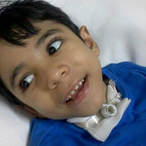
Muhammad Abu Haddaf 9
When 9-year-old Muhammad Abu Haddaf died in hospital in the early hours of 6 December 2017, his mother Nisrin could not be at his bedside as she was nine-months pregnant.
Muhammad’s father, her husband Saleh, was too afraid to tell her the news. But when she found out from relatives later that morning, “I couldn’t control myself,” Nisrin said. “I cried and screamed for my son.”
“I lost my son Muhammad. It was decided by God,” Nisrin said. “Then I praised God and prayed for God to have mercy on him and forgive him.”
Muhammad died of injuries he sustained during Israel’s 2014 assault on the Gaza Strip.
This week, the Israeli human rights group B’Tselem published a detailed account of what happened to Muhammad’s family during the attack and in the years after.
Two missiles
When Israel’s assault began, Saleh and Nisrin took their five children and moved from their home in al-Qarara village to Saleh’s sister’s home in Khan Younis, in southern Gaza.
On 8 August 2014, when a ceasefire was supposed to be in effect, the parents and children went back to al-Qarara to pick up some belongings from the ruins of their home that had been bombed by Israeli forces.
While they were there, the Israelis fired two missiles that “were presumably targeted at three members of the larger Abu Haddaf family, who were standing at their own doorstep nearby and were not taking part in the fighting,” B’Tselem states.
These missiles killed three people, including two children. According to Defense for Children International-Palestine, the two children were Mahmoud Muhammad Saleh Abu Haddaf, 8, and Mahmoud Khalid Musa Abu Haddaf, 15, and their adult relative was Suleiman Samir Abu Haddaf.
Saleh and Nisrin and four of their children were injured and taken to hospital in Khan Younis.
Muhammad, 6 at the time, was wounded in the abdomen and spine. Doctors at the European Hospital in Rafah – near Gaza’s border with Egypt – had to resuscitate him and he suffered lack of oxygen to his brain. During his 15-day stay in the hospital, they also found his legs were paralyzed.
Muhammad was taken to Turkey for treatment, where he was joined by his then 5-year-old brother Ayash, who was also partially paralyzed.
During their months in Turkey, the boys were separated from their parents. “I can’t describe how terrible I felt. I was wounded and so were my sons,” Nisrin said. “On top of that, Muhammad was far away and I didn’t know exactly how he was doing.”
“My sons needed me, but I was physically and emotionally exhausted,” Nisrin said.
Living in “wrecked house”
Months later, the family returned to their home in al-Qarara, which Saleh managed to partially rebuild, and Muhammad was hospitalized again in Gaza in December 2014. The following year he underwent stomach and throat surgery at Hadassah hospital in Jerusalem.
But his condition continued to deteriorate; after he returned home, he lost his eyesight and ability to speak. He required intense care costing hundreds of dollars a week that the family could not afford.
“I worked on and off and spent everything I earned on Muhammad,” Saleh said. “My father, my sister and my brothers gave me money, but they’re all clerks and they don’t have a lot to give.”
And through it all, in the cold of winter and heat of summer, “we lived in a wrecked house, without real walls, windows or doors,” Saleh added.
In October last year, the family moved into a new home built with the help of relatives and UNRWA, the UN agency for Palestine refugees.
Muhammad was readmitted to the European Hospital in November 2017 but after two unsuccessful surgeries for abdominal swelling he died there the following month.
“Muhammad’s condition remained serious the whole time, until we lost him on Wednesday at two in the morning,” Nisrin said following his death.
Attacking civilians“
Bombing and shelling densely populated areas was one of the most horrifying aspects of Israel’s conduct in what Israel called Operation Protective Edge,” B’Tselem states. “This policy led to the killing of at least 1,055 Palestinians – almost half of those killed in the operation – of which 405 were children and 229 were women.”
B’Tselem dismisses as “entirely unfounded” Israel’s claim that its bombing of civilian areas in this manner was lawful.
Israel’s assault destroyed or badly damaged 18,000 houses, leaving more than 100,000 Palestinians homeless. According to UN figures cited by B’Tselem, almost 30,000 remained homeless three years after the attack.
And from the more than 11,000 persons wounded, most “had to make do with the deficient medical services available in Gaza and to pay for many of the treatments themselves, without compensation from Israel for the damage it caused.”
In Muhammad’s case, B’Tselem says, “his family and doctors fought for his life, as he was transferred from one hospital to the next – in Gaza, Turkey and Israel – paralyzed, blind and unable to speak.”
Muhammad’s life and death is just one story of the horrific and lasting impact of this systematic and massive Israeli violence for which there has yet to be any accountability or justice.
When 9-year-old Muhammad Abu Haddaf died in hospital in the early hours of 6 December 2017, his mother Nisrin could not be at his bedside as she was nine-months pregnant.
Muhammad’s father, her husband Saleh, was too afraid to tell her the news. But when she found out from relatives later that morning, “I couldn’t control myself,” Nisrin said. “I cried and screamed for my son.”
“I lost my son Muhammad. It was decided by God,” Nisrin said. “Then I praised God and prayed for God to have mercy on him and forgive him.”
Muhammad died of injuries he sustained during Israel’s 2014 assault on the Gaza Strip.
This week, the Israeli human rights group B’Tselem published a detailed account of what happened to Muhammad’s family during the attack and in the years after.
Two missiles
When Israel’s assault began, Saleh and Nisrin took their five children and moved from their home in al-Qarara village to Saleh’s sister’s home in Khan Younis, in southern Gaza.
On 8 August 2014, when a ceasefire was supposed to be in effect, the parents and children went back to al-Qarara to pick up some belongings from the ruins of their home that had been bombed by Israeli forces.
While they were there, the Israelis fired two missiles that “were presumably targeted at three members of the larger Abu Haddaf family, who were standing at their own doorstep nearby and were not taking part in the fighting,” B’Tselem states.
These missiles killed three people, including two children. According to Defense for Children International-Palestine, the two children were Mahmoud Muhammad Saleh Abu Haddaf, 8, and Mahmoud Khalid Musa Abu Haddaf, 15, and their adult relative was Suleiman Samir Abu Haddaf.
Saleh and Nisrin and four of their children were injured and taken to hospital in Khan Younis.
Muhammad, 6 at the time, was wounded in the abdomen and spine. Doctors at the European Hospital in Rafah – near Gaza’s border with Egypt – had to resuscitate him and he suffered lack of oxygen to his brain. During his 15-day stay in the hospital, they also found his legs were paralyzed.
Muhammad was taken to Turkey for treatment, where he was joined by his then 5-year-old brother Ayash, who was also partially paralyzed.
During their months in Turkey, the boys were separated from their parents. “I can’t describe how terrible I felt. I was wounded and so were my sons,” Nisrin said. “On top of that, Muhammad was far away and I didn’t know exactly how he was doing.”
“My sons needed me, but I was physically and emotionally exhausted,” Nisrin said.
Living in “wrecked house”
Months later, the family returned to their home in al-Qarara, which Saleh managed to partially rebuild, and Muhammad was hospitalized again in Gaza in December 2014. The following year he underwent stomach and throat surgery at Hadassah hospital in Jerusalem.
But his condition continued to deteriorate; after he returned home, he lost his eyesight and ability to speak. He required intense care costing hundreds of dollars a week that the family could not afford.
“I worked on and off and spent everything I earned on Muhammad,” Saleh said. “My father, my sister and my brothers gave me money, but they’re all clerks and they don’t have a lot to give.”
And through it all, in the cold of winter and heat of summer, “we lived in a wrecked house, without real walls, windows or doors,” Saleh added.
In October last year, the family moved into a new home built with the help of relatives and UNRWA, the UN agency for Palestine refugees.
Muhammad was readmitted to the European Hospital in November 2017 but after two unsuccessful surgeries for abdominal swelling he died there the following month.
“Muhammad’s condition remained serious the whole time, until we lost him on Wednesday at two in the morning,” Nisrin said following his death.
Attacking civilians“
Bombing and shelling densely populated areas was one of the most horrifying aspects of Israel’s conduct in what Israel called Operation Protective Edge,” B’Tselem states. “This policy led to the killing of at least 1,055 Palestinians – almost half of those killed in the operation – of which 405 were children and 229 were women.”
B’Tselem dismisses as “entirely unfounded” Israel’s claim that its bombing of civilian areas in this manner was lawful.
Israel’s assault destroyed or badly damaged 18,000 houses, leaving more than 100,000 Palestinians homeless. According to UN figures cited by B’Tselem, almost 30,000 remained homeless three years after the attack.
And from the more than 11,000 persons wounded, most “had to make do with the deficient medical services available in Gaza and to pay for many of the treatments themselves, without compensation from Israel for the damage it caused.”
In Muhammad’s case, B’Tselem says, “his family and doctors fought for his life, as he was transferred from one hospital to the next – in Gaza, Turkey and Israel – paralyzed, blind and unable to speak.”
Muhammad’s life and death is just one story of the horrific and lasting impact of this systematic and massive Israeli violence for which there has yet to be any accountability or justice.
29 jan 2018
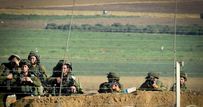
Israeli Occupation Forces (IOF) on Monday opened machinegun fire at Palestinian agricultural lands east of Rafah city south of the Gaza Strip.
The PIC reporter said that Israeli military watchtowers positioned east of Rafah targeted Gazan farmers while working in their farms in the area. However, no injuries were reported, according to medical sources.
Rafah farmers on Monday returned to work in their lands by the assistance of the International Committee of the Red Cross for the first day after being banned from farming in the eastern areas for 12 years.
The PIC reporter said that Israeli military watchtowers positioned east of Rafah targeted Gazan farmers while working in their farms in the area. However, no injuries were reported, according to medical sources.
Rafah farmers on Monday returned to work in their lands by the assistance of the International Committee of the Red Cross for the first day after being banned from farming in the eastern areas for 12 years.
26 jan 2018

Nine Palestinians were moderately injured on Friday during clashes that broke out between Palestinian youths and Israeli Occupation Forces (IOF) in different locations east of Gaza Strip.
The clashes erupted in protest at the US President Donald Trump’s recognition of Occupied Jerusalem as the capital of Israel.
The spokesman of the Health Ministry said that the injuries included three wounded men east of Jabalya, three east of Gaza city and three others east of Khan Younis.
According to PIC reporters, the clashes flared east of Khan Younis, al-Buraij, Gaza and Jabalya.
The clashes erupted in protest at the US President Donald Trump’s recognition of Occupied Jerusalem as the capital of Israel.
The spokesman of the Health Ministry said that the injuries included three wounded men east of Jabalya, three east of Gaza city and three others east of Khan Younis.
According to PIC reporters, the clashes flared east of Khan Younis, al-Buraij, Gaza and Jabalya.
21 jan 2018
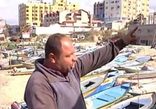
Israeli navy ships opened fire, on Sunday morning on several Palestinian fishing boats, in Gaza territorial waters, in the northern part of the coastal region.
Eyewitnesses said the soldiers fired dozens of live rounds, and chased the boats, forcing the fishermen back to shore, without being able to fish to provide for their families.
The attack is part of ongoing Israeli violations against the fishermen, and their boats, in addition to attacks against farmers and workers, on their lands, in several border areas, in the besieged Gaza Strip.
The attacks led to dozens of casualties, including fatalities, in addition to the abduction of fishermen, and the illegal confiscation of their boats, their only source of livelihood.
Eyewitnesses said the soldiers fired dozens of live rounds, and chased the boats, forcing the fishermen back to shore, without being able to fish to provide for their families.
The attack is part of ongoing Israeli violations against the fishermen, and their boats, in addition to attacks against farmers and workers, on their lands, in several border areas, in the besieged Gaza Strip.
The attacks led to dozens of casualties, including fatalities, in addition to the abduction of fishermen, and the illegal confiscation of their boats, their only source of livelihood.
19 jan 2018
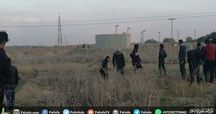
Four Palestinians were wounded by Israeli gunfire during clashes that erupted on Friday afternoon with Israeli Occupation Forces (IOF) at Gaza border.
Eyewitnesses said that a Palestinian youth was shot and injured in clashes that broke out near Karni crossing east of Gaza. Another man was wounded in similar clashes near Beit Hanoun crossing (Erez).
Two others were also shot and wounded near Nahal Oz site in the east. The injured were transferred to al-Shifa Hospital in Gaza.
The ongoing clashes have been continued for the seventh consecutive Friday in protest at the Israeli repeated violations and the US recognition of Occupied Jerusalem as the capital of Israel.
Eyewitnesses said that a Palestinian youth was shot and injured in clashes that broke out near Karni crossing east of Gaza. Another man was wounded in similar clashes near Beit Hanoun crossing (Erez).
Two others were also shot and wounded near Nahal Oz site in the east. The injured were transferred to al-Shifa Hospital in Gaza.
The ongoing clashes have been continued for the seventh consecutive Friday in protest at the Israeli repeated violations and the US recognition of Occupied Jerusalem as the capital of Israel.
17 jan 2018
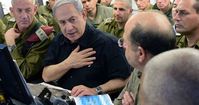
Israel’s outgoing chief archivist warned that most of the contents of Israeli archives, which include war crimes and human rights violations, is closed and will never be opened.
According to Lazovik, Israelis have committed war crimes.
The Shin Bet security service was involved in education in the Arab sector; Israel treated its Arab (and other) citizens in a manner that doesn’t dignify a self-proclaimed democratic entity.
He added that among three million files shelved in the government archives only 550 have been opened.
In a scathing report issued Monday and published by Haaretz on Wednesday, Yaakov Lazovik summarized the issues faced by the Israel State Archives, which is subordinate to the Prime Minister’s Office.
Lazovik, who announced his retirement eight months after more than six years on the job, said that under the cloak of national security concerns, Israeli government conceals from the public material much of it unrelated to security issues.
This includes material that could prove embarrassing to the government, such as human rights violations.
According to Lazovik, Israelis have committed war crimes.
The Shin Bet security service was involved in education in the Arab sector; Israel treated its Arab (and other) citizens in a manner that doesn’t dignify a self-proclaimed democratic entity.
He added that among three million files shelved in the government archives only 550 have been opened.
According to Lazovik, Israelis have committed war crimes.
The Shin Bet security service was involved in education in the Arab sector; Israel treated its Arab (and other) citizens in a manner that doesn’t dignify a self-proclaimed democratic entity.
He added that among three million files shelved in the government archives only 550 have been opened.
In a scathing report issued Monday and published by Haaretz on Wednesday, Yaakov Lazovik summarized the issues faced by the Israel State Archives, which is subordinate to the Prime Minister’s Office.
Lazovik, who announced his retirement eight months after more than six years on the job, said that under the cloak of national security concerns, Israeli government conceals from the public material much of it unrelated to security issues.
This includes material that could prove embarrassing to the government, such as human rights violations.
According to Lazovik, Israelis have committed war crimes.
The Shin Bet security service was involved in education in the Arab sector; Israel treated its Arab (and other) citizens in a manner that doesn’t dignify a self-proclaimed democratic entity.
He added that among three million files shelved in the government archives only 550 have been opened.
15 jan 2018
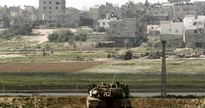
A flock of Israeli military vehicles rolled on Monday morning into eastern Beit Hanun (Erez) crossing, north of the blockaded Gaza Strip.
According to eye-witnesses, four Israeli army bulldozers stationed at Tzukim site moved dozens of meters into the eastern corners of Beit Hanun crossing and leveled Palestinian lands near the border fence.
The infiltration is another chain in Israel’s series of violations of the Cairo-brokered ceasefire accord struck in the wake of the 2014 offensive on the besieged coastal enclave of Gaza.
According to eye-witnesses, four Israeli army bulldozers stationed at Tzukim site moved dozens of meters into the eastern corners of Beit Hanun crossing and leveled Palestinian lands near the border fence.
The infiltration is another chain in Israel’s series of violations of the Cairo-brokered ceasefire accord struck in the wake of the 2014 offensive on the besieged coastal enclave of Gaza.
14 jan 2018

The Israeli occupation authorities on Sunday decided to close Karem Abu Salem crossing, southeast of Rafah city in the southern Gaza Strip, until further notice.
The closure followed Israeli air strikes launched east of Rafah near the border crossing.
Karem Abu Salem is the sole outlet through which goods are brought into the besieged Gaza Strip. The Israeli authorities usually close the crossing on Fridays and Saturdays and during Jewish holidays.
The Israeli occupation army announced later on Sunday that it had destroyed a Hamas tunnel running from Gaza into the 1948 occupied Palestinian territories.
Israeli army spokesman claimed that the destroyed tunnel, which passes under Karem Abu Salem, is 1.5 km long.
The closure followed Israeli air strikes launched east of Rafah near the border crossing.
Karem Abu Salem is the sole outlet through which goods are brought into the besieged Gaza Strip. The Israeli authorities usually close the crossing on Fridays and Saturdays and during Jewish holidays.
The Israeli occupation army announced later on Sunday that it had destroyed a Hamas tunnel running from Gaza into the 1948 occupied Palestinian territories.
Israeli army spokesman claimed that the destroyed tunnel, which passes under Karem Abu Salem, is 1.5 km long.
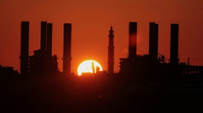
An elderly couple using a charcoal grill to heat their house, in Gaza, was found dead on Sunday afternoon, the Palestinian Ministry of Health said.
A Health Ministry spokesperson said that the man, who was 90 years old and his wife 88 years old, used the charcoal grill to heat their house due to the lack of electricity.
According to Days of Palestine, the spokesperson said that using the charcoal grill in a bad ventilation system causes carbon monoxide poisoning.
Gazans have been suffering during winter due to the inability to warm up the homes because of the lack of electricity, which is an integral part of the 11-year-old siege implemented and sustained by Israel, Egypt and the Palestinian Authority.
A Health Ministry spokesperson said that the man, who was 90 years old and his wife 88 years old, used the charcoal grill to heat their house due to the lack of electricity.
According to Days of Palestine, the spokesperson said that using the charcoal grill in a bad ventilation system causes carbon monoxide poisoning.
Gazans have been suffering during winter due to the inability to warm up the homes because of the lack of electricity, which is an integral part of the 11-year-old siege implemented and sustained by Israel, Egypt and the Palestinian Authority.
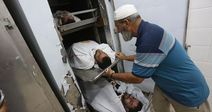
By Ramona Wadi
Israeli Agricultural Minister Uri Ariel wants more injured and dead Palestinians in Gaza. “What is this special weapon we have that we fire and see pillars of smoke and fire, but nobody gets hurt?” he said on local radio. “It is time for there to be injuries and deaths as well.” This was reported by Haaretz.
Ariel’s comments come at a time when, bolstered and emboldened by US support over Jerusalem, Israel is seeking to increase ways in which Palestinians are restricted even further in terms of politics, freedom of movement and resistance to its military occupation. The increasingly threatening rhetoric, combined with its often resultant violence, is a clear message that Israel wants Palestinian existence to be determined according to its own colonial needs.
Indeed the minister’s remarks are indicative of Israel’s need for violence and conflict to sustain its existence. Framing his penchant for more deaths against the narrative of the purported “Palestinian terrorist”, he also amalgamated his demands with Defence Minister Avigdor Lieberman’s comments from 2016. At that time, far-right extremist Lieberman recommended the further fragmentation of Palestinians by suggesting that the homes of those involved in resistance should be demolished, and that those who “desire coexistence” should be rewarded.
Lieberman’s differentiation of Palestinians, particularly the latter group, is a simplistic approach which negates many of the reasons why not all Palestinians are visibly involved in resistance. One obvious reason which Israel has perpetrated is the juxtaposition of survival due to extreme poverty and lack of basic necessities, and the struggle against several forms of state violence. It also refutes the fact that most Palestinians, unlike the leadership of the Palestinian Authority, do not want to live under colonial rule.
Whether Ariel’s statement suggests yet another military offensive against the Palestinians in the besieged Gaza Strip remains to be seen. However, there is no doubt that demands for state violence against civilians will become more brazen, as Israel basks in the impunity which is sustained on two levels: that generated by its own actions and absence of accountability under the pretext of “security concerns”; and the international community’s endorsement of this false narrative.
Another ramification of Ariel’s words is the separation of the visible injuries and killings in the occupied West Bank and the silent forms of slow extermination in Gaza as a result of Israeli-imposed deprivation. Clearly, he prefers the macabre spectacle of multitudes of injured and dead Palestinian civilians in Gaza and, what is more, he is allowed to express himself in such a manner without censure of any kind, safe in the knowledge that killing Palestinians has not only become normalised, but also expected.
The dehumanization of Palestinians in the Israeli minister’s words is also reflective of how statistics contribute to the absence of Palestinians in terms of collective memory. For Israel, the numbers serve to boost the false claims of self-defense. Conversely, statistics for Palestinians depict the cycles of murder by Israeli institutions. The international community, on the other hand, is partial to the anonymity of numbers, particularly when there is no requirement other than for it to turn a blind eye until Israel decides upon the next phase of Gaza’s destruction, whereupon the UN will exhort the colonial entity’s “right” to defend itself against the colonized. In doing so, it will also affirm its contempt for human rights and resolutions by refusing to uphold the Palestinian people’s right to self-determination and, indeed, their right to resist military occupation by any means available.
– Ramona Wadi is a staff writer for Middle East Monitor (MEMO)
Israeli Agricultural Minister Uri Ariel wants more injured and dead Palestinians in Gaza. “What is this special weapon we have that we fire and see pillars of smoke and fire, but nobody gets hurt?” he said on local radio. “It is time for there to be injuries and deaths as well.” This was reported by Haaretz.
Ariel’s comments come at a time when, bolstered and emboldened by US support over Jerusalem, Israel is seeking to increase ways in which Palestinians are restricted even further in terms of politics, freedom of movement and resistance to its military occupation. The increasingly threatening rhetoric, combined with its often resultant violence, is a clear message that Israel wants Palestinian existence to be determined according to its own colonial needs.
Indeed the minister’s remarks are indicative of Israel’s need for violence and conflict to sustain its existence. Framing his penchant for more deaths against the narrative of the purported “Palestinian terrorist”, he also amalgamated his demands with Defence Minister Avigdor Lieberman’s comments from 2016. At that time, far-right extremist Lieberman recommended the further fragmentation of Palestinians by suggesting that the homes of those involved in resistance should be demolished, and that those who “desire coexistence” should be rewarded.
Lieberman’s differentiation of Palestinians, particularly the latter group, is a simplistic approach which negates many of the reasons why not all Palestinians are visibly involved in resistance. One obvious reason which Israel has perpetrated is the juxtaposition of survival due to extreme poverty and lack of basic necessities, and the struggle against several forms of state violence. It also refutes the fact that most Palestinians, unlike the leadership of the Palestinian Authority, do not want to live under colonial rule.
Whether Ariel’s statement suggests yet another military offensive against the Palestinians in the besieged Gaza Strip remains to be seen. However, there is no doubt that demands for state violence against civilians will become more brazen, as Israel basks in the impunity which is sustained on two levels: that generated by its own actions and absence of accountability under the pretext of “security concerns”; and the international community’s endorsement of this false narrative.
Another ramification of Ariel’s words is the separation of the visible injuries and killings in the occupied West Bank and the silent forms of slow extermination in Gaza as a result of Israeli-imposed deprivation. Clearly, he prefers the macabre spectacle of multitudes of injured and dead Palestinian civilians in Gaza and, what is more, he is allowed to express himself in such a manner without censure of any kind, safe in the knowledge that killing Palestinians has not only become normalised, but also expected.
The dehumanization of Palestinians in the Israeli minister’s words is also reflective of how statistics contribute to the absence of Palestinians in terms of collective memory. For Israel, the numbers serve to boost the false claims of self-defense. Conversely, statistics for Palestinians depict the cycles of murder by Israeli institutions. The international community, on the other hand, is partial to the anonymity of numbers, particularly when there is no requirement other than for it to turn a blind eye until Israel decides upon the next phase of Gaza’s destruction, whereupon the UN will exhort the colonial entity’s “right” to defend itself against the colonized. In doing so, it will also affirm its contempt for human rights and resolutions by refusing to uphold the Palestinian people’s right to self-determination and, indeed, their right to resist military occupation by any means available.
– Ramona Wadi is a staff writer for Middle East Monitor (MEMO)
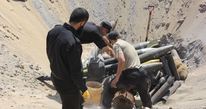
A Palestinian child was injured on Sunday morning in the blockaded Gaza Strip after a device, believed to be part of Israel’s war remnants, exploded.
The Palestinian Health Ministry spokesman Ashraf al-Qidrah said a 16-year-old boy sustained moderate wounds after an explosive device went off east of Jabalia.
Several Palestinians were killed or injured as a result of blasts triggered by the leftovers of Israel’s war kit used during its offensives on the besieged coastal enclave of Gaza.
The Palestinian Health Ministry spokesman Ashraf al-Qidrah said a 16-year-old boy sustained moderate wounds after an explosive device went off east of Jabalia.
Several Palestinians were killed or injured as a result of blasts triggered by the leftovers of Israel’s war kit used during its offensives on the besieged coastal enclave of Gaza.
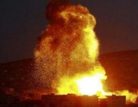
The Israeli Air Force fired, on Saturday at night, at least two missiles into a siege-busting tunnel near the Egyptian border, in Rafah, in the southern part of the Gaza Strip.
The Israeli army said it attacked “underground infrastructure along the border with Egypt.” The first missile was fired by a drone, before an F-19 fighter jet fired another missile into the same area.
The attack was carried out while army drones flew over many areas in Rafah, and other parts of southern Gaza.
The Israeli army only said that it struck “a tunnel on the border with the Gaza Strip,” and held Hamas fully responsible for any escalation that could emerge in the coastal region.
Meanwhile, Israeli Ynet News has reported that Israel has also decided not to open Karam Abu Salem (Kerem Shalom) crossing, Sunday, following an assessment by the army, and added that the military did not provide any details for the reason behind the move.
It described the decision to close the crossing as “unusual,” because there have been no shells fired from Gaza into Israeli areas in recent days, while protests near border areas have also been declining.
Israeli airstrike targets agricultural land east of Rafah
An Israeli warplane late on Saturday night bombed an agricultural piece of land near the Karam Abu Salem border crossing to the east of Rafah area in southern Gaza.
A Palestinian Information Center (PIC) reporter said that two air-to-surface missiles hit an agricultural plot of land east of Rafah, causing resounding explosions that were heard by residents of southern Gaza.
In this regard, spokesman for the Israeli army Avichai Adrei claimed that an aerial attack was launched on an infrastructure belonging to the resistance, which he called terrorist, in southern Rafah near the border between Gaza and Egypt.
He held the Hamas Movement responsible for everything happening in Gaza against Israel, without explaining further.
The air raid was preceded by Israel’s announcement of its intention to close the Karam Abu Salem crossing, east of Rafah, on Sunday for alleged security reasons.
The Israeli army said it attacked “underground infrastructure along the border with Egypt.” The first missile was fired by a drone, before an F-19 fighter jet fired another missile into the same area.
The attack was carried out while army drones flew over many areas in Rafah, and other parts of southern Gaza.
The Israeli army only said that it struck “a tunnel on the border with the Gaza Strip,” and held Hamas fully responsible for any escalation that could emerge in the coastal region.
Meanwhile, Israeli Ynet News has reported that Israel has also decided not to open Karam Abu Salem (Kerem Shalom) crossing, Sunday, following an assessment by the army, and added that the military did not provide any details for the reason behind the move.
It described the decision to close the crossing as “unusual,” because there have been no shells fired from Gaza into Israeli areas in recent days, while protests near border areas have also been declining.
Israeli airstrike targets agricultural land east of Rafah
An Israeli warplane late on Saturday night bombed an agricultural piece of land near the Karam Abu Salem border crossing to the east of Rafah area in southern Gaza.
A Palestinian Information Center (PIC) reporter said that two air-to-surface missiles hit an agricultural plot of land east of Rafah, causing resounding explosions that were heard by residents of southern Gaza.
In this regard, spokesman for the Israeli army Avichai Adrei claimed that an aerial attack was launched on an infrastructure belonging to the resistance, which he called terrorist, in southern Rafah near the border between Gaza and Egypt.
He held the Hamas Movement responsible for everything happening in Gaza against Israel, without explaining further.
The air raid was preceded by Israel’s announcement of its intention to close the Karam Abu Salem crossing, east of Rafah, on Sunday for alleged security reasons.
Truce violations List of names Pictures of martyrs
Days: Aug: 26 - 25 - 24 - 23 - 22 - 21 - 20 - 19 - 18 - 17 - 16 - 15 - 14 - 13 - 12 - 11 - 10 - 9 - 8 - 7 - 6 - 5 - 4 - 3 - 2 - 1
July: 31 - 30 - 29 - 28 - 27 - 26 - 25 - 24 - 23 - 22 - 21 - 20 - 19 - 18 - 17 - 16 - 15 - 14 - 13 - 12 - 11 - 10 - 9 - 8
